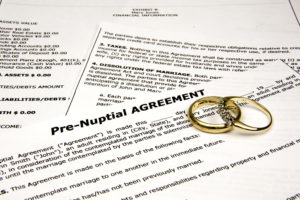Antenuptial Agreement Lawyer Chicago, IL

Prenups
Illinois Lawmakers passed the Uniform Premarital Agreement Act (UPAA) in 1990. This law address specifics rules about the antenuptial agreement process. Many couples draw up these agreements before they are married in order to address some of the following issues:
- Clarify the property that each spouse owns and brings to the marriage in order to avoid any disputes in the future.
- Protecting one spouse from becoming legally liable for the other spouse’s debts racked up prior to the marriage.
- Determining what assets and/or property should be bequeathed to certain individuals as opposed to who would normally legally receive these assets. For example, if one spouse has children from a prior relationship, an antenuptial agreement can specify that in the event of that spouse’s death, any property he or she owned prior to the marriage would go to those children and not the surviving spouse.
It is critical to have a seasoned prenuptial agreement lawyer Chicago, IL families trust work with you in drafting any agreement you and your fiancé sign. Your fiancé should also have their own attorney. Per the UPAA, a prenup can be set aside if one of the following factors applies:
- The antenuptial agreement was not entered into voluntarily.
- The antenuptial agreement was unenforceable or unconscionable when the parties entered into it.
Proving the person did not enter into the agreement voluntarily can involve incidents where the person may have been under the influence of drugs or other factors that could have limited their understanding of what they were signing.
Proving the agreement was unenforceable or unconscionable can involve issues such as any incidents where one spouse hid financial information from the other spouse, such as not disclosing how much debt they really had.
It is important to note that no antenuptial agreement can address child support obligations should the marriage end. All child support calculations are done by the family court based on what the current Illinois child support laws are at the time. Having these types of disallowed stipulations in your agreement will not void out the agreement but it could result in the judge overseeing the divorce to carefully examine the rest of the agreement should the other party attempt to get the agreement thrown out.
To learn more about prenups and how one could benefit you, contact a Chicago, IL antenuptial agreement lawyer from Hurst, Robin, Kay & Allen, LLC today.
